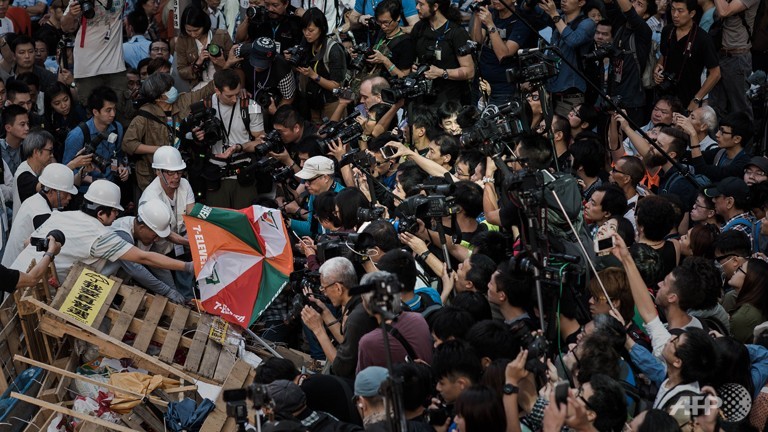Hong Kong police remove more Mongkok barricades

Bailiffs remove barricades set up by pro-democracy protesters, under a court injunction in the Mongkok district of Hong Kong
on Nov 25, 2014. (Photo: AFP/Philippe Lopez)
HONG KONG: Authorities in Hong Kong on Tuesday (Nov 25) tore down barricades at a protest site in Mongkok, the scene of some of the more violent clashes to take place during nearly two months of pro-democracy sit-ins.
Dozens of bailiffs, backed by more than 100 police officers, stood guard as workers cleared makeshift barriers obstructing part of a busy shopping street in Mongkok, one of three main protest sites where thousands of demonstrators have camped out demanding free leadership elections.
Instructed by police to vacate the area, protesters, some wearing goggles, helmets and gas masks, responded with jeers, shouting "we want real universal suffrage" and raising a large yellow banner with the same slogan. "I am not going to move. I will let them arrest me," Ng Pun-tuk, a 78-year-old protester wearing a helmet told AFP. "This is a once-in-a-lifetime opportunity to achieve democracy. I am prepared to go to jail," Ng, who was one of about 200 protesters at the site, declared.
"People at the scene, please leave as soon as possible in accordance with the court injunction," a police spokesman ordered the crowd - which included a scrum of journalists - over a loudspeaker before the clearance action.
BRITISH LAWMAKERS AXE CHINA TRIP
A group of British MPs cancelled a trip to Shanghai after Chinese embassy officials withheld the travel visa of Conservative lawmaker Richard Graham, who had sparked a parliamentary debate on the protests in Hong Kong, reported South China Morning Post. The paper reported that Graham was to have made the trip on Tuesday, as part of a UK-China Leadership Forum.
The delegation had issued an ultimatum to the Chinese embassy - grant Mr Graham a visa by Monday or the trip would be cancelled. No visa was issued, reported The Guardian.
Mr Graham had called for a probe into possible breaches of the Sino-British Joint Declaration, where China and the United Kingdom agreed on the "one country, two systems" policy for Hong Kong.
“The freedoms that Britain and China pledged to maintain are delicate ... If we allow any of those freedoms to be curtailed and if we say nothing about any dilution of Hong Kong’s high degree of autonomy, whether deliberate or inadvertent, we risk colluding in Hong Kong’s gradual - not immediate - decline,” South China Morning Post quoted Mr Graham as saying.
POLICE TO CLEAR MORE AREAS
The court injunction for Tuesday only covered the protest area on Argyle Street, but police are expected to execute a separate court injunction for a larger portion of the Mongkok protest area on busy Nathan Road on Wednesday morning (Nov 26), reports said.
The pro-democracy protests, which have paralysed parts of the city, drew tens of thousands of people initially, but the crowds have shrunk as the movement has struggled to maintain momentum. The Chinese government insists that candidates for a 2017 leadership vote in Hong Kong must be vetted by a loyalist committee - an arrangement the protesters said will ensure the election of a pro-Beijing stooge.
Last Tuesday, dozens of police and bailiffs stood guard as workers dismantled metal barricades blocking access to a skyscraper opposite government headquarters, on the edge of the sprawling main camp in the central district of Admiralty.
What the stars mean:
★ Poor ★ ★ Promising ★★★ Good ★★★★ Very good ★★★★★ Exceptional
Latest News
More News
- Russian President congratulates Vietnamese Party leader during phone talks (January 25, 2026 | 09:58)
- Worldwide congratulations underscore confidence in Vietnam’s 14th Party Congress (January 23, 2026 | 09:02)
- Political parties, organisations, int’l friends send congratulations to 14th National Party Congress (January 22, 2026 | 09:33)
- 14th National Party Congress: Japanese media highlight Vietnam’s growth targets (January 21, 2026 | 09:46)
- 14th National Party Congress: Driving force for Vietnam to continue renewal, innovation, breakthroughs (January 21, 2026 | 09:42)
- Vietnam remains spiritual support for progressive forces: Colombian party leader (January 21, 2026 | 08:00)
- Int'l media provides large coverage of 14th National Party Congress's first working day (January 20, 2026 | 09:09)
- Vietnamese firms win top honours at ASEAN Digital Awards (January 16, 2026 | 16:45)
- ASEAN Digital Ministers' Meeting opens in Hanoi (January 15, 2026 | 15:33)
- ASEAN economies move up the global chip value chain (December 09, 2025 | 13:32)
















 Mobile Version
Mobile Version